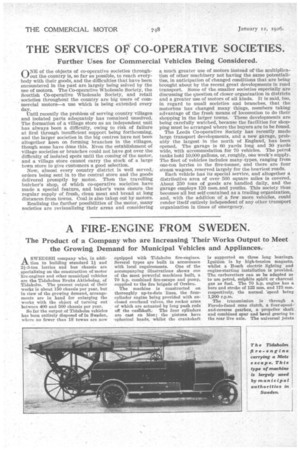THE SERVICES Or CO-OPERATIVE SOCIETIES.
Page 14

If you've noticed an error in this article please click here to report it so we can fix it.
Further Uses for Commercial Vehicles Being Considered.
ONE of the objects of co-operative societies through‘...lout the country is, so far as possible, to reach everybody with their goods, and the difficulties that have been encountered in the past are largely being solved by the use of motors. The Co-operative Wholesale Society, the Scottish Co-operative Wholesale Society, and retail societies throughout the country are big users of commercial motors—a use which is being extended every day.
Until recently the problem of serving country villages and isolated parts adequately has remained unsolved. The formation of a village store as an independent unit has always been a difficulty, owing to risk of failure at first through insufficient support being forthcoming, and the larger societies in the big centres have not been altogether keen on forming branches in the villages, though some have dOne this. Even the establishment of 'village societies or branches could not have got over the difficulty of isolated spots until the coming of the motor, and a village store cannot carry the stock of a large town store to give customers a good selection.
Now, almost every country district is well served, orders being sent in to the central store and the goods delivered promptly by motor. Then the travelling butcher's shop, of which co-operative societies have made a special feature, and baker's vans ensure the regular supply of fresh, clean meat and bread at long distances from towns. Coal is also taken out by motors.
Realizing the further possibilities of the motor, many societies are revisualizing their areas and considering a much greater use of motors instead of multiplica tion of other machinery not having the same potentialities, in anticipation of changed conditions that are being brought about by the recent great developments in road transport. Some of the smaller societies especially are discussing the question of closer organization in districts and a greater use of motors of all kinds. It is said, too, in regard to small societies and branches, that the motorbus has changed many things, members taking advantage of the fresh means of locomotion to do their shopping in the larger towns. These developments are being carefully watched, because the facilities for shopping must be arranged where the buyers are to be found.
The Leeds Co-operative Society has recently made large transport developments, and a new garage, probably the largest in the north of England, has been opened. The garage is 60 yards long and 30 yards wide, with accommodation for 70 vehicles. The petrol tanks hold 10,000 gallons, or, roughly, one week's supply. The -fleet of vehicles includes many types, ranging from one-ton lorries to the five-tonner, and there are four steam wagons, reserved largely for the heaviest roads.
Each vehicle has its special service, and altogether a distributive area of over 500 square miles is covered. About 250 tons of goods are handled daily, and the garage employs 120 men and youths. This society thus becomes all but self-contained as a trading organization, and, with the addition of a few more vehicles, could render itself entirely independent of any other transport organization in times of emergency.
































